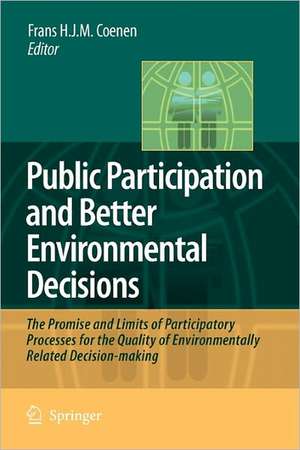Public Participation and Better Environmental Decisions: The Promise and Limits of Participatory Processes for the Quality of Environmentally Related Decision-making
Editat de Frans H. J. M. Coenenen Limba Engleză Paperback – 19 oct 2010
There is a discourse in the literature and in policy practice as to whether decision-making improves in quality as additional relevant information by the public is considered. The promise that public participation holds has to be weighed against the limitations of public participation in terms of costs and interest conflicts. The question that Public Participation and Better Environmental Decisions seeks to answer for academics, planners and civil servants in all environmental relevant policy fields is: What restricts and what enables information to hold the ‘promise’ that public participation lead to better environmental decision-making and better outcomes?
| Toate formatele și edițiile | Preț | Express |
|---|---|---|
| Paperback (1) | 636.63 lei 6-8 săpt. | |
| SPRINGER NETHERLANDS – 19 oct 2010 | 636.63 lei 6-8 săpt. | |
| Hardback (1) | 642.83 lei 6-8 săpt. | |
| SPRINGER NETHERLANDS – 2 dec 2008 | 642.83 lei 6-8 săpt. |
Preț: 636.63 lei
Preț vechi: 748.97 lei
-15% Nou
Puncte Express: 955
Preț estimativ în valută:
121.82€ • 127.65$ • 100.70£
121.82€ • 127.65$ • 100.70£
Carte tipărită la comandă
Livrare economică 11-25 aprilie
Preluare comenzi: 021 569.72.76
Specificații
ISBN-13: 9789048181070
ISBN-10: 9048181070
Pagini: 220
Ilustrații: VIII, 209 p.
Dimensiuni: 155 x 235 x 12 mm
Greutate: 0.31 kg
Ediția:Softcover reprint of hardcover 1st ed. 2009
Editura: SPRINGER NETHERLANDS
Colecția Springer
Locul publicării:Dordrecht, Netherlands
ISBN-10: 9048181070
Pagini: 220
Ilustrații: VIII, 209 p.
Dimensiuni: 155 x 235 x 12 mm
Greutate: 0.31 kg
Ediția:Softcover reprint of hardcover 1st ed. 2009
Editura: SPRINGER NETHERLANDS
Colecția Springer
Locul publicării:Dordrecht, Netherlands
Public țintă
ResearchCuprins
Citizens' Voices in Environmental Policy.- The Use of Focus Groups in Assessing Ethnic and Racial Group Concerns About Nuclear Waste Cleanup.- Planning Cells and Citizen Juries in Environmental Policy: Deliberation and Its Limits.- The Power of Visioning: The Contribution of Future Search Conferences to Decision-Making in Local Agenda 21 Processes.- Participatory Decision-Making for Sustainable Consumption.- Hazardous Waste Anyone?.- Fora, Networks and Public Examinations.- Concepts of Participatory Decision-Making in Dutch Infrastructure Planning.- Local Agenda 21: ‘Meaningful and Effective ’ Participation?.- Conclusions.
Recenzii
From the reviews:
“This edited collection is an inquiry into the impact of public participation on the quality of environmental decision making. … for the policy scientist interested in delving into decision processes, Coenen and collaborators provide a worthwhile contribution that introduces the reader to many of the benefits and challenges of participatory decision making and provides plenty of examples from a wide array of decision-making arenas and methods. Overall, Public Participation and Better Environmental Decisions contributes nicely to the growing body of empirical evidence about participatory processes.” (Cedar Morton, Policy Sciences, Vol. 44, 2011)
“This edited collection is an inquiry into the impact of public participation on the quality of environmental decision making. … for the policy scientist interested in delving into decision processes, Coenen and collaborators provide a worthwhile contribution that introduces the reader to many of the benefits and challenges of participatory decision making and provides plenty of examples from a wide array of decision-making arenas and methods. Overall, Public Participation and Better Environmental Decisions contributes nicely to the growing body of empirical evidence about participatory processes.” (Cedar Morton, Policy Sciences, Vol. 44, 2011)
Textul de pe ultima copertă
Public Participation and Better Environmental Decisions is about a specific ‘promise’ that participation holds for environmental decision-making. Many of the arguments for public participation in (inter)national environmental policy documents are functional, that is to say they see public participation as a means to an end. Sound solutions to environmental problems require participation beyond experts and political elites. Neglecting information from the public leads to legitimacy questions and potential conflicts.
There is a discourse in the literature and in policy practice as to whether decision-making improves in quality as additional relevant information by the public is considered. The promise that public participation holds has to be weighed against the limitations of public participation in terms of costs and interest conflicts. The question that Public Participation and Better Environmental Decisions seeks to answer for academics, planners and civil servants in all environmental relevant policy fields is: What restricts and what enables information to hold the ‘promise’ that public participation lead to better environmental decision-making and better outcomes?
There is a discourse in the literature and in policy practice as to whether decision-making improves in quality as additional relevant information by the public is considered. The promise that public participation holds has to be weighed against the limitations of public participation in terms of costs and interest conflicts. The question that Public Participation and Better Environmental Decisions seeks to answer for academics, planners and civil servants in all environmental relevant policy fields is: What restricts and what enables information to hold the ‘promise’ that public participation lead to better environmental decision-making and better outcomes?
Caracteristici
Examines the relation between public participation and the quality of decision making from a functional perspective Contributes to an important discourse on the role of public participation in environmental decision making Explores cases of environmental decision making in different policy settings and countries and from different disciplinary angles












